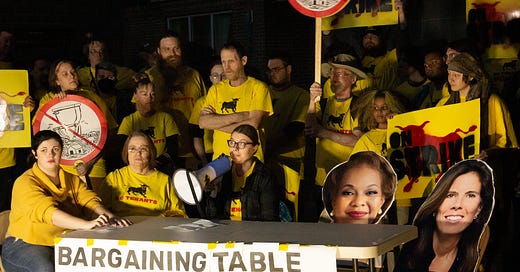When it comes to supporting aggressive tenant union activity, I confess to having decidedly mixed feelings.
On one hand, I wholeheartedly believe that collective action by those impacted by injustice is how this world changes for the better, as countless social movements have demonstrated. That makes me a huge fan of tenant unions, and eager to write about them. (For example, here and here and here and here.) I happily chose to devote the author proceeds for my new book, Lessons From Eviction Court: How We Can End Our Housing Crisis, to the Tenant Union Federation.
On the other hand, I’m a lawyer for tenants.
So I am keenly aware of the limited legal rights that tenants have when exercising their ultimate power, which is the withholding of rent. I have seen way too many tenants being evicted because they did not pay rent after the landlords refused to fulfill their duties of providing habitable or safe housing or properly crediting rent payments, etc.
And lawyers are, by trade, professional worriers. Often, our role is to envision the worst case scenario and to help protect our clients from enduring that scenario. A rent strike is dangerous as hell for tenants.
But if the rent strike is successful? That is a game changer. Like a labor strike, withholding rent hits the most powerful in the spot where they are most vulnerable.
So it is exciting to hear the news out of Kansas City of the proof of concept for a successful rent strike.
Striking Kansas City Tenants image by Catboy69, Creative Commons license
Last October, after trying without success to have their landlord fix broken cooling, heating, and plumbing systems and address pest infestations, tenants at Independence Towers in Kansas City launched a rent strike. Over the course of eight months, Independence Towers Tenant Union members withheld more than a quarter-million dollars in rent. Predictably, in return they faced regular threats of eviction.
But earlier this month, they reached an agreement with the 11-story building’s new owner. The bargain included affordable rents for the first year, automatic lease renewal for all tenants, and a 5% cap on rent increases in year two. The owner committed to a timeline for permanent HVAC and plumbing repairs and pest extermination. The striking tenants are not required to pay back any withheld rent and the owner promised no retaliation for tenant organizing.
In other words, a big win.
In an excellent In These Times article by Rebecca Burns, Kansas City Tenants organizer Justin Stein praised the striking tenants as “frankly, really courageous.”
From the tenant lawyer perspective, I cannot agree more. And their courage is likely to provide a model for others to follow.
Since these brave tenants persevered, they deserve the last word here, from their statement issued when the deal was finalized:
“We came together to form a union, we fought for our homes, we took the ultimate collective risk by launching and sustaining a rent strike. Now that we know the power of our union, we will remain active in the months and years to come, continuing the work to ensure that Independence Towers is the healthy, safe community we deserve.”






It is a very brave thing to do. Withholding rent is a dangerous bet, but it is very powerful when the tenants unite. It also sheds a light on a neglectful landlord. Chances are the surrounding neighborhood also feels stuck with the deteriorating apartment complex. The local city can’t like the picture this paints about the local living conditions when the news finds the story.
So often in eviction court, all discussion ends at the eviction hearing after it’s clear that the tenant hasn’t paid the rent. Tenants are told to raise their damages concerns at the hearing days after the eviction hearing, rather than making eviction contingent on the landlord’s compliance with the lease agreement.